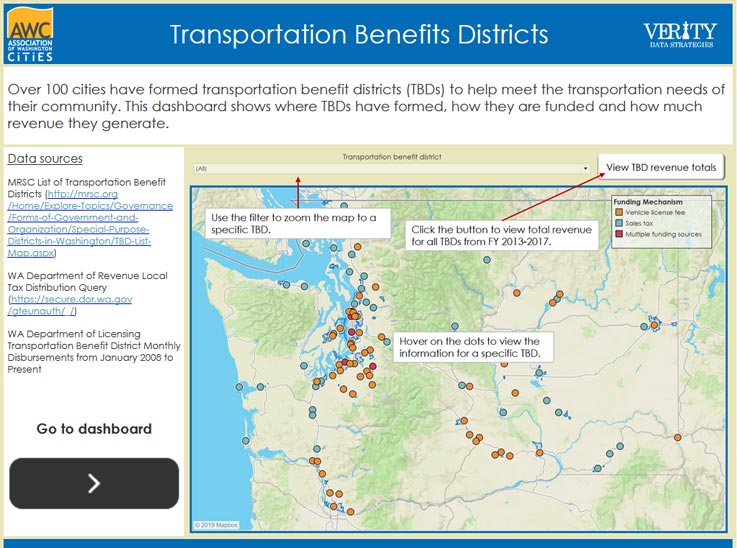What is Initiative 976?
Initiative 976 (I-976) is an initiative to the Legislature that was filed for consideration in the 2019 legislative session. The Legislature did not act on the initiative; therefore, I-976 will be presented to voters during the next general election in November 2019. I-976 is often described as the “$30 car tab initiative,” but it also proposes significant changes to many other aspects of the state’s transportation system, including repeal of the authority for city Transportation Benefit Districts (TBDs) to impose fees.
What does the initiative propose?
I-976 is an expansive proposal that would significantly change how the state’s transportation system generates revenue. If passed, the initiative would do the following:
- Limit motor vehicle license fees (car tab fees) to $30 per year;
- Repeal or reduce certain motor vehicle weight fees;
- Repeal the authority for TBDs to impose vehicle fees;
- Reduce electric vehicle fees to $30 per year;
- Repeal the 0.3% tax on motor vehicle retail sales;
- Require local motor vehicle excise taxes (MVETs) to be calculated using the Kelley Blue Book base value of the vehicle;
- Conditionally repeal the Sound Transit 0.8% MVET, and;
- Require the retirement or refinancing of Sound Transit-related bonds.
How would city TBDs and local projects be impacted?
Cities have the authority to establish TBDs for the purposes of acquiring, constructing, improving, providing and funding transportation improvements. Currently, over 100 cities have formed TBDs to fund local transportation projects. TBDs are primarily funded through vehicle license fees or local sales taxes.
If I-976 passes, the authority for TBDs to impose fees would be eliminated. Over 60 TBDs receive revenue from vehicle license fees, and 55 TBDs use vehicle licenses fees as their sole funding source. In fiscal year 2018, vehicle license fees raised $58.2 million in revenue.
If I-976 passes, the authority for Transportation Benefit Districts to impose fees would be eliminated.
To understand how I-976 would impact your city and others across the state, check out the AWC data tool below to discover TBDs in your area and their revenue sources.

How would state transportation funding be impacted?
If I-976 passes, there would be reductions in many of the state accounts associated with transportation funding, including the Multimodal Transportation Account, the Motor Vehicle Account, State Patrol Highway Account, and the Transportation Partnership Account. The state estimates lost revenue of $588 million in the 2019-21 biennium, $677 million in the 2021-23 biennium, and $758 million in the 2023-25 biennium.
What can I do as a city elected official to respond to I-976?
Elected officials have many options for officially engaging with initiatives but should be aware of some prohibited actions. AWC has compiled an extensive list of allowed and prohibited actions for city elected officials. For further reference, please review the PDC Guidelines for Local Government Agencies in Election Campaigns.
What is AWC’s role on initiatives during election season?
AWC does not take positions for or against ballot initiatives. AWC’s role is to provide our members with educational materials that can be shared with elected officials, staff, and local communities.